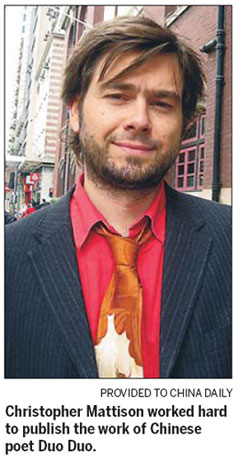Translation, mostly a labor of love

Given that only 3 percent of what's published in English is translation, if you're in the business as a niche publisher/translator, chances are, you're doing it for love.
As Christopher Mattison, formerly executive editor at Zephyr Press in the United States who is now starting up a new publishing venture at Hong Kong City University, says, "Profit is generally not part of the discussion. There is only measured loss."
Sometimes the rewards come when they are least expected, as a sudden acknowledgement of years of quietly slogging away.
For example, Zephyr had published the work of Duo Duo, a prominent member of the "obscure" school of poets who reacted against the straitjacketing of ideas during the "cultural revolution" (1966-1976) for a decade.
Winning the Neustadt Prize in 2010 gave Zephyr an extra fillip, and by the time the awards ceremony was held in Oklahoma, they marked the occasion with a fresh collection of short stories by the author, Snow Plain, in English.
It was a reassuring moment for Mattison, who had painstakingly worked toward publishing Duo Duo, in English, for the first time.
Prolific translator Michael Berry, whose translation credits include Wang Anyi's Song of Everlasting Sorrow and Yu Hua's To Live, shares the experience of going around knocking on the doors of prospective publishers until he got lucky.
"All the novels I took on did eventually find their home - even if in some cases it took dozens of rejections and years of waiting," he says.
Berry, an associate professor of contemporary Chinese cultural studies at the University of California, Santa Barbara, is happy to note "greater interest in China and Chinese literature than 15 years ago when I began doing translation".
Mattison says usually translators act as a link between the publisher and the author. "In most cases, an author already has a relationship with one (maybe two) translators, which gives us a good sample of work, and allows us to identify other works that we'd like to see for the finished collection.
"Most presses don't offer advances and can't promise much in terms of sales, so translators must feel passionate enough about the work and writer to devote the time to creating an entire manuscript," he adds.
"The first thing that I consider is my personal attachment and passion for a given literary work."
Granted, the translatability of the original literary voice and the market potential need to be factored in, he adds, but once his heart is set on the original work, Berry says, there is usually no stopping him.






















